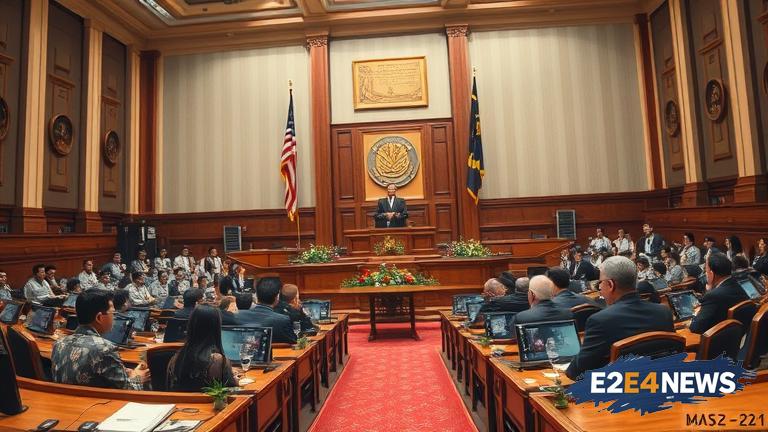Malaysia’s parliament is set to address two of the country’s most pressing issues: the ageing population and the housing crisis in Kuala Lumpur. The ageing population has been a growing concern in Malaysia, with the country’s elderly population expected to increase significantly in the coming years. This demographic shift is likely to put a strain on the country’s healthcare and social security systems. To mitigate this, the government has proposed several initiatives, including increasing the retirement age and encouraging older workers to remain in the workforce. The parliament will also discuss the housing moratorium in Kuala Lumpur, which has been in place since 2020. The moratorium was implemented to curb speculation and stabilize the property market, but it has also been criticized for limiting the supply of new housing units. The government has announced plans to review the moratorium and consider lifting it in certain areas. The housing crisis in Kuala Lumpur is a complex issue, with many factors contributing to it, including a shortage of affordable housing, high construction costs, and a lack of available land. The government has proposed several solutions, including increasing the supply of affordable housing, providing subsidies for first-time homebuyers, and implementing rent control measures. The parliament will also discuss the impact of the ageing population on the housing market, including the need for age-friendly housing and the potential for older workers to downsize and free up larger homes for younger families. Additionally, the government will consider the role of technology in addressing the housing crisis, including the use of innovative materials and construction methods to reduce costs and increase efficiency. The parliament’s discussion on these issues is expected to be lively, with many stakeholders, including developers, homeowners, and community groups, eager to have their voices heard. The government has emphasized the need for a comprehensive and sustainable solution to the housing crisis, one that balances the needs of different stakeholders and ensures that the benefits of growth and development are shared equitably. The ageing population and housing crisis are not unique to Malaysia, but the country’s unique cultural and economic context presents distinct challenges and opportunities. The government’s approach to these issues will be closely watched by other countries in the region, which are facing similar demographic and economic challenges. In conclusion, the Malaysian parliament’s discussion on the ageing population and housing crisis is a critical step towards addressing these pressing national issues. The government’s proposals and initiatives will be closely scrutinized, and the outcome of the discussion will have significant implications for the country’s future. The ageing population and housing crisis are complex and multifaceted issues, requiring a comprehensive and sustainable solution. The government’s commitment to addressing these issues is a positive step, and the parliament’s discussion will provide a valuable opportunity for stakeholders to contribute to the development of effective solutions. Furthermore, the government’s emphasis on innovation and technology in addressing the housing crisis is a promising approach, one that could help to reduce costs, increase efficiency, and improve the overall quality of life for Malaysian citizens. Overall, the Malaysian parliament’s discussion on the ageing population and housing crisis is an important step towards creating a more sustainable and equitable future for the country. The government’s proposals and initiatives will be closely watched, and the outcome of the discussion will have significant implications for the country’s economic and social development. The ageing population and housing crisis are critical issues that require immediate attention and action. The government’s commitment to addressing these issues is a positive step, and the parliament’s discussion will provide a valuable opportunity for stakeholders to contribute to the development of effective solutions. The use of technology and innovation in addressing the housing crisis is a promising approach, one that could help to reduce costs, increase efficiency, and improve the overall quality of life for Malaysian citizens. The government’s emphasis on sustainability and equity is also a positive step, one that recognizes the need for a comprehensive and sustainable solution to the housing crisis. In addition, the government’s proposal to increase the supply of affordable housing is a critical step towards addressing the housing crisis. The provision of subsidies for first-time homebuyers and the implementation of rent control measures are also important initiatives that will help to make housing more affordable and accessible. The parliament’s discussion on the ageing population and housing crisis will provide a valuable opportunity for stakeholders to contribute to the development of effective solutions. The government’s commitment to addressing these issues is a positive step, and the outcome of the discussion will have significant implications for the country’s future. The ageing population and housing crisis are complex and multifaceted issues, requiring a comprehensive and sustainable solution. The government’s emphasis on innovation and technology in addressing the housing crisis is a promising approach, one that could help to reduce costs, increase efficiency, and improve the overall quality of life for Malaysian citizens. The government’s proposal to review the housing moratorium and consider lifting it in certain areas is also a critical step towards addressing the housing crisis. The parliament’s discussion on the ageing population and housing crisis will be closely watched, and the outcome of the discussion will have significant implications for the country’s economic and social development.
